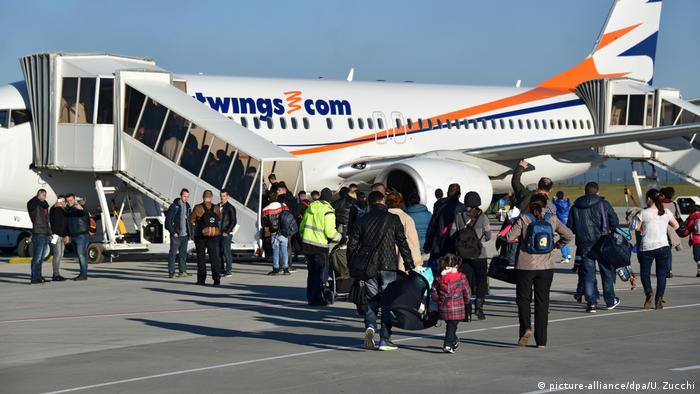Pressure from Berlin
The Interior Ministry intends to up the pressure on uncooperative countries of origin — particularly because a lack of documents is currently the most common reason why people are granted exceptional leave to remain. Their leverage here could be "development aid policy, it could be visa policy," said Johannes Dimroth, a ministry spokesman. They want to explore "all possibilities in the bilateral relationship." After all, he pointed out, countries of origin are obliged to take their citizens back.
Ideas like these do not find favor at the Economic Cooperation and Development Ministry. It would rather focus on introducing positive incentives. The minister, Gerd Müller, of the Christian Social Union, has announced that up to €500 million ($616 million) a year will be used to finance jobs and traineeships for returnees to Iraq, Nigeria, Afghanistan and other countries. He hopes that this will convince 20,000 to 30,000 asylum-seekers a year to return voluntarily.
The mere fact that a passport is missing is not proof of displaced people's intent to deceive. Smugglers often take refugees' documents from them, Claus-Ulrich Prölss, the head of the Cologne Refugee Council, told DW. He added that some people also destroy their documents at the beginning of their journeys, because they fear the police or the military in their own countries, as happens in Eritrea, for example.
"Of course a person should and must present their passport if they have one, so their identity is established right from the start," Prölss said. "A passport alone is not sufficient reason to deport someone; there have to be others." Prölss also warns asylum-seekers not to give the police false information about themselves. That could backfire, if not immediately, then later on, when they're well integrated and should be getting residency rights. "That's when people often come in to the advice centers and say they switched the letters in their name, or changed their date of birth," Prölss said. "And that's a problem, because in many cases deceiving the authorities about your identity will disqualify you from obtaining the right of residence."
If they've lost their passports, asylum-seekers must help the authorities to obtain new ones and clarify their identities. If they don't fulfill their obligation to cooperate, the authorities could search their cellphones or their homes and impose penalties. John received a penalty order "for failing to cooperate in the acquisition of papers." He lodged an appeal, but last week the district court decided nonetheless to impose a €700 fine, which is a lot of money for him. In the meantime he has been to the Nigerian embassy and applied for a new passport.


